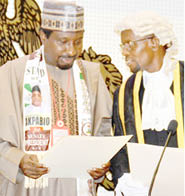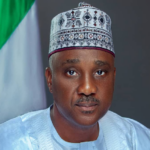Last-minute intrigues and intense lobbying by the Presidency led to the emergence of Senator Godswill Akpabio and Tajudeen Abass as the 10th Senate President and Speaker, respectively, Daily Trust reports.
The 10th National Assembly was inaugurated yesterday by the Clerk to the National Assembly (CNA), Sani Magaji Tambuwal, after President Bola Ahmed Tinubu issued a proclamation letter.
Akpabio, a senator representing Akwa-Ibom North West, was declared the 10th Senate President after polling 63 votes to defeat his opponent, Senator Abdul’aziz Yari, Zamfara West, who got 46 votes as announced by the Clerk to the National Assembly.
Akpabio was nominated by Ali Ndume (APC, Borno) and seconded by Adeola Olamilekan (APC, Ogun); while Yari was nominated by Elisha Abbo (APC, Adamawa) and seconded by Jimoh Ibrahim (APC, Ondo).
- We’ll airlift all Nigerian hajj pilgrims before deadline – Flynas
- Hoodlums beat, tear protocol officer’s shirt during assembly inauguration in Niger
Senator Jibrin Barau (APC, Kano) emerged as Deputy Senate President unopposed as Orji Uzor Kalu (APC, Abia) eying the position from Yari’s camp backed out. Barau was nominated for the position by David Umahi (APC Ebonyi) and seconded by Saliu Mustapha (APC, Kwara).
A few days before the inauguration, Vice President Kashim Shettima, the arrowhead of the Presidency’s campaign team for Akpabio, said he was ready to kneel and beg other lawmakers who were yet to join Akpabio’s camp.
In a bid to avoid the 2015 scenario where Bukola Saraki and Yakubu Dogara emerged as Senate President and Speaker respectively against the party’s decision, the 10th Assembly inauguration started two hours behind schedule.
The CNA had, in a statement, earlier announced that the inauguration would commence by 10am. But lawmakers were seated in the two chambers as early as 8am. Lawmakers arrived at the parliament as early as 8am.
Protest over Yari’s nomination
There was a mild drama on the floor following the attempt to stop the nomination of Yari for the Senate president’s seat.
After Senator Abbo nominated Yari, some lawmakers protested against it.
Senator Mohammed Tahir Mongono (APC, Borno) said the nomination of Yari, being a non-ranking senator, contravenes Order 3 of the Senate Standing Rule.
But lawmakers in Yari’s camp dismissed Monguno’s submission, shouting ‘Nooo’.
The CNA overruled Mongono, saying Yari’s nomination was in order and not against any rule of the Senate or relevant provisions of the 1999 Constitution.
Factors that gave Yari 46 votes
Yari contested the position against the party’s choice after calls for a review of the APC zoning formula went without desired results.
Daily Trust reliably gathered that three former governors, who are regarded as landlords of the Senate mobilised senators for Yari.
Two credible sources said the three former governors played key roles in the emergence of Bukola Saraki when he defied the directives of the party in 2015. One of the sources said the former governors control a bloc in the Senate.
“They worked for Yari. They were instrumental in the emergence of Bukola in 2015. In 2019, Lawan won when he was able to bring them on board following Buhari’s intervention. They are powerful,” he said. Another source, a senator said except for the push by the presidency, Yari would have defeated Akpabio with the three governors on his side.
“The Monday meeting between President Tinubu and former Senate President Ahmad Lawan turned the table in favour of Akpabio. He was with Yari before the meeting,” the source added.
Also, the alliance between Yari and Senator Orji Uzor Kalu, another aggrieved Senate presidency aspirant contributed to the votes he polled. Kalu agreed to pair with Yari as deputy Senate president. Yari’s candidacy was seen by his backers and promoters as a northern agenda, lamenting that the zoning template is skewed against the North.
They said all three arms of government will be headed by southerners with Akpabio as the Senate President.
They said voting for the party’s endorsed candidate amounted to acceptance of undue executive interference in the affairs of the legislature. These factors worked in favour of Yari.
Also, the secret ballot system adopted for the election in the Senate boosted Yari’s chance, as APC senators who were not comfortable with the choice of Akpabio had the free will to vote against the party’s preferred candidate.
How Abbas, Kalu emerged as Speaker, deputy
Abbas, a House of Representatives member representing Zaria Federal Constituency of Kaduna State, won the speaker’s seat with a landslide victory. Abbas, who is the anointed candidate of the ruling APC, polled 353 votes to defeat his rivals, former Deputy Speaker Ahmed Idris Wase (APC, Plateau) and Aminu Sani Jaji (APC, Zamfara) who got three votes each. The result was announced by the Clerk to the National Assembly, Sani Magaji Tambuwal, who said 359 members-elect voted during the exercise.
Daily Trust reports that a member-elect for the Jalingo/Yorro/ Zing Federal Constituency of Taraba State, Isma’ila Yushua Maihanchi, died before the inauguration.
Before the commencement of voting, Abbas was nominated by the immediate past House Leader, Alhassan Ado Doguwa and seconded by Nnolim Nnaji.
Tijjani Kayode Ismail nominated Wase and was seconded by Mohammed Ari Abdulmumin. Ahmed Yusuf Ibrahim Doro nominated Aminu Sani Jaji who was seconded by Mohammed Aminu Ibrahim.
Like Barau, Benjamin Okezie Kalu (APC, Abia) emerged as Deputy Speaker of the 10th House of Representatives unopposed.
Kalu was nominated by Babajimi Benson (Lagos) and seconded by Khadija Bukar Abba.
Kalu, who was the spokesman of the immediate past 9th House of Representatives, was the preferred choice of the ruling party.
The Clerk to the National Assembly, Sani Magaji Tambuwal, administered the oath of allegiance and oath of office to the presiding officers.
Factors that influenced Abbas’ victory
For the Speakership race, the last-minute decision of two major contenders – Muktar Betara Aliyu (APC, Borno) and Yusuf Adamu Gagdi (APC, Plateau) in stepping out of the contest following the intervention by President Bola Ahmed Tinubu, cleared the coast for Abbas’ seamless emergence as Speaker.
The withdrawal of Betara and Gagdi from the fold of the aggrieved G-7 aspirants who had earlier vowed to present a consensus candidate to upset the preferred choice of the ruling party was a great factor that worked in favour of Kalu.
Daily Trust reports that the adoption of the open ballot system where members-elect were made to openly name the candidates they were voting for, was another factor that worked in favour of Abbas.
A number of the lawmakers who would have voted for the candidates of their choice were however swayed along the line in voting otherwise because of the bandwagon effect of the open balloting system.
For instance, a lawmaker, Afam Oghene when called upon to vote said, “my heart is with Wase” but his vote was for Tajudeen Abbas.
Following his comments, the Clerk had to call him again to vote properly and he said his vote was for Tajudeen Abbas.
Daily Trust reports that some loyalists and members-elect who had been campaigning and pushing for Wase and Jaji speakership ditched them on the floor of the House and voted for Abbas.
Another factor that also influenced the outcome of the election in the House is the overwhelming influence of state governors who, it was learnt, had prevailed on their respective lawmakers to ensure they voted in a particular direction or be ready to face repercussions.
Daily Trust reports that some of the governors, especially those of the ruling APC, were at the National Assembly Tuesday to witness the inauguration.
It was learnt that a number of the lawmakers-elect had to do the bidding of their governors since it was an open ballot.
House Standing rule alteration, a game changer
The change in the House Standing order which favoured the open balloting system against the secret balloting system which has been in operation, was believed to be a game changer in the outcome of yesterday’s election of presiding officers of the House.
The 9th House had upon its inauguration in 2019, made some amendments to the House Standing Rule which approved open balloting for the election of Speaker and deputy speaker.
Section 2 (f) (iii) of the Rule said during the “election of presiding officers”, “every member voting shall name clearly and in the open the candidate of his choice.”
But before yesterday’s inauguration, some aggrieved lawmakers had raised concerns that the alteration to the house rule which compels lawmakers to openly name who they are voting for during the election of the next leadership of the House, was allegedly a move by Gbajabiamila to intimidate members from voting their consciences.
Daily Trust learnt that although, the amendment in question was said to have been effected on July 25, 2019, upon the inauguration of the 9th House, the aggrieved lawmakers however said they were not privy to that particular insertion in the house rule.
No more acrimony — Yari’s camp
The camp of the Zamfara State governor described the election process as free, fair and credible without much-anticipated drama.
Speaking with newsmen after the election, Senator Abdul Ningi (PDP, Bauchi), spokesman for Yari’s campaign group, said the acrimony that characterised the campaign had completely vanished.
He said, “We have refused to be intimidated by any enforcement and that is why we said there must be an election.
“The election was free and fair and to be honest I was expecting it to be so.”
On whether the position he took was that of his party, PDP, Ningi said it was not but that of the minority caucus but noted that not all of them actually voted on the same page.
Akpabio, Abbas speak
Akpabio in his inaugural speech extended the hand of fellowship to all senators.
He said the 10th Senate is an uncommon one that will collaborate with the executive arm of government in the area of improved revenue generation for the country.
The Speaker 10th House of Representatives, Abbas promised not to take the mandate given to him for granted and urged members of the House to join hands with him in forging ahead for the common good of the country.
By Abdullateef Salau, Itodo D. Sule & Balarabe Alkassim




